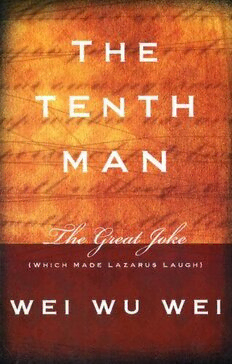Table Of ContentTHE
TENTH
MAN
The Great Joke
(WHICH MADE LAZARUS LAUGH)
WEI WU WEI
THE TENTH MAN
The Tenth Man is the only Man.
There is No Other.
The
Tenth Man
THE GREAT JOKE
(which made Lazarus laugh)
Wei Wu Wei
S
SENTIENT PUBLICATIONS, LLC
First Sentient Publications edition 2003
Copyright © 2003 by Hong Kong University Press. Reprinted in the
United States by Sentient Publications, by arrangement with Hong
Kong University Press, Hong Kong
All rights reserved. This book, or parts thereof, may not be repro
duced in any form without permission, except in the case of brief
quotations embodied in critical articles and reviews.
Printed in the United States of America
Cover design by Kim Johansen, Black Dog Design
Library of Congress Cataloging-in-Publication Data
Wei, Wu Wei.
The tenth man the great joke (which made Lazarus laugh) / Wei
Wu Wei.—1st Sentient Publications ed.
p. cm.
Includes index.
ISBN 1-59181-007-8
1. Asia—Religion. 2. Philosophy, Asian. 3. Buddhism—Doctrines.
4. Taoism—Doctrines. I. Title.
BL1023.W45 2003
291.2’2—cd21
2002042947
SENTIENT PUBLICATIONS
A Limited Liability Company
1113 Spruce Street
Boulder, CO 80302
www.sentientpublications.com
Foreword to the Second Edition
By profession, I am a licensed clinical psychologist.
I was in private practice for thirty-seven years, and my work
as a psychotherapist was fairly traditional. I was always
drawn to Eastern religions and philosophies and most of
my private studies were in this area. I viewed myself as a
dedicated “seeker,” and enjoyed the fantasy that this put
me into the center of everything exciting, critical, and sig
nificant. There were answers, and I was going to find them
in this lifetime.
One day a friend handed me a book by Wei Wu
Wei and asked me if I knew anything about it. He said he
didn’t understand it and wondered if I would read it to
see what it was all about. In retrospect, I now see that noth
ing was accidental about this moment at all. I read the
book that night from cover to cover. Two things stand out.
First, I didn’t have a clue what the book was about and
second, I knew in my bones that I had been handed a gift.
Unconsciously I knew exactly what the book was about—it
made the hair on my arms stand straight up and my heart
raced for no apparent reason. At the conscious level, I was
permitted, thanks to denial, to grasp every ninth word if I
was lucky. The book’s style was very abstruse, even a bit
pedantic and “Oxfordian,” but the hidden message set off
a firestorm of inquiry that persists to this day. That was
over twenty-five years ago.
I have since read all of Wei Wu Wei’s books, and I
love them all like children. Each is an exquisite gem. I
II THE TENTH MAN
have also read everything everyone else said or thought
about him. It is clear now that he had a profound impact on
many seekers, including the great and wonderful Balsekar.
It is poetic justice that very little is known about
Wei Wu Wei. This is certainly in keeping with his belief
that there is no one to know anything about. What we do
know is that he was born into a very affluent family in Ire
land in the year 1895 and that he died at the age of ninety-
one in 1986. Curiously, not unlike Siddartha, he left the fold
to study, travel, and learn about life’s great mysteries. His
chief mentor was Sri Ramana Maharshi at Sri Ramanashram
in Tiruvannamalai, India. At the age of sixty-three he pub
lished his first of eight books, which were released between
1958 and 1974. He also made contributions to a variety of
periodicals, including The Mountain Path, as well as The
Middle Way, and Etre Libre, a French periodical.
Psychology is all about working with people and
their problems. Wei Wu Wei’s interpretation of Buddhist
philosophy shook the very foundation of all my beliefs,
particularly those that apply to the dynamics of psycho
therapy. Little did I know that I was going to engage in a long
struggle between what we say is, and what might actually be.
Little by little, materialism gave way to the truth that ev
erything we refer to as reality isn’t what we insist it is.
These new views forced me to alter the way I worked
with people. As I began to see things differently, my prac
tice shifted from the standard Western view of life to a
much vaster view of existence as a dream in which every
thing we do is content in the dream. The shift was from
real people in trouble to spirits in trouble trying to be
real people. Denial saw to it this shift came very slowly,
but the pull in this direction was as arresting as the ideas
FOREWORD TO THE SECOND EDITION III
in Wei Wu Wei’s books. There was no turning back. The
whole process reminds me of waking up from a giant slum
ber, a trance that locks fiction into fact and fact into fic
tion. This metanoesis, as Wei Wu Wei refers to it, feels like
a 180-degree shift in course, in which enlightenment hap
pens to the dreamers in the dream and not to the dreamed
figures who pretend to be real people.
-Dr. Gregory Tucker

